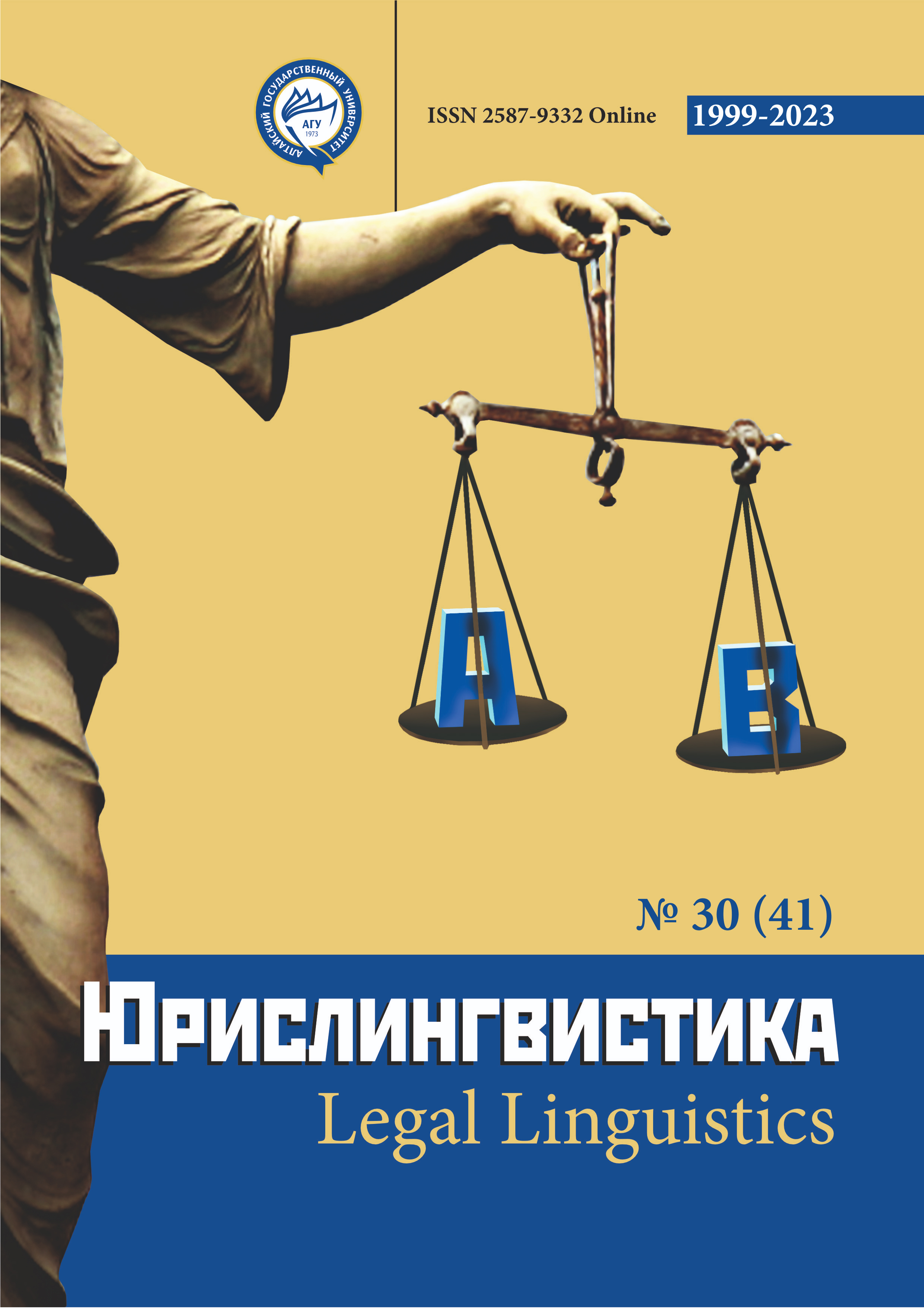Identification Features in Forensic Examination of Text Borrowing
УДК 81`33, ББК 81
Abstract
In the article, within the framework of the theory of criminalistic identification, based on works of the well-known criminalist scientist Prof. Valentin Koldin (1925–2020), we consider the features that a forensic expert works with when detecting textual borrowings (copy-paste and plagiarism).
An optimal classification of identification features put into six groups is proposed: text coincidence at character level, misprints, punctuation errors, grammatical errors, speech and logical errors, and other speech features. The author suggests using the term "errative method" in the examination of borrowings and considers identification features in terms of their suitability for research – specificity, manifestation, and stability.
At the same time, the differences between the examination of text borrowings and the traditional forensic authorship examination are emphasized: different identifiable objects (text and person, respectively), different properties of these objects, and, consequently, different features. The author analyzes the classifications of identification features represented in the most important scientific and methodological manuals on forensic authorship examination (in Russian), compares these classifications with the one given in the article, and concludes about the fundamental differences of the feature complexes.
The article concludes that the proposed set of features provides a significant identification redundancy of the material – in contrast to both traditional authorship examination and, in general, to the majority of forensic enquiries. This redundancy allows the expert to make a reliable conclusion about the non-randomness of the coincidence of features, that is, about the identity of the borrowed text.
Downloads
Metrics
References
Абрамкина Е. Е. Автороведческая экспертиза протокола допроса: основные особенности и методика анализа / Вестник Томского государственного университета. - 2017. - № 415. - С. 158-163.
Абрамкина Е. Е. Идентификационные признаки протокола допроса и методика автороведческого анализа / Вестник Новосибирского государственного университета. Серия Лингвистика и межкультурная коммуникация. - 2019. - Т. 17. - № 3. - С. 97-108.
Вул С. М. Криминалистическое исследование признаков письменной речи. Киев, 1973.
Вул С. М. О классификации идентификационных признаков письменной речи в судебно-автороведческой экспертизе / Вестник Университета им. О. Е. Кутафина (МГЮА). - 2019. - № 5. - С. 213-217.
Вул С. М. Судебно-автороведческая идентификационная экспертиза: Методические основы. Харьков, 2007.
Вул С. М. Теоретические и методические вопросы криминалистического исследования признаков письменной речи. М., 1977.
Грайс Г. П. Логика и речевое общение / Новое в зарубежной лингвистике. Вып. 16. Лингвистическая прагматика. М., 1985. С. 217-237.
Колдин В. Я. Судебная идентификация. М., 2003.
Комиссаров А. Ю. Криминалистическое исследование письменной речи. М., 2000.
Красса С. И. Методика определения меры сходства между объектами речеведческих экспертиз / Юрислингвистика. - 2023. - № 27 (38). - С. 106-110.
Лингвистический энциклопедический словарь (ЛЭС) / Гл. ред. В. Н. Ярцева. М., 1990.
Ляшевская О. Н., Шаров С. А. Новый частотный словарь русской лексики. 2009. URL: http://dict.ruslang.ru/freq.php?
Рубцова И. И., Ермолова Е. И., Безрукова А. И. и др. Комплексная методика производства автороведческих экспертиз: Методические рекомендации. М., 2007.
Corder S. P. The significance of learner’s errors / International Review of Applied Linguistics in Language Teaching. - 1967. - Т. 5 (4). - С. 161-170.
Copyright (c) 2023 Елена Новожилова

This work is licensed under a Creative Commons Attribution 4.0 International License.
The authors, which are published in this journal, agree to the following conditions:
1. Authors retain the copyright to the work and transfer to the journal the right of the first publication along with the work, at the same time licensing it under the terms of the Creative Commons Attribution License, which allows others to distribute this work with the obligatory indication of the authorship of this work and a link to the original publication in this journal .
2. The authors retain the right to enter into separate, additional contractual agreements for the non-exclusive distribution of the version of the work published by this journal (for example, to place it in the university depository or to publish it in a book), with reference to the original publication in this journal.
3. Authors are allowed to post their work on the Internet (for example, in a university repository or on their personal website) before and during the review process of this journal, as this may lead to a productive discussion, as well as more links to this published work (See The Effect of Open Access).











